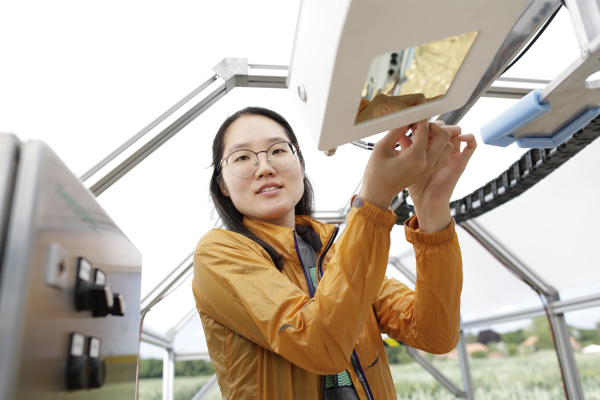New Fully Funded Studentships
We are offering range of fully funded studentships in the application of Artificial Intelligence (AI) to sustainable agri-food, which will take place in the new Centre for Doctoral Training, SUSTAIN.

/prod01/university-of-lincoln-cdn-pxl/media/responsive2017/research/newresearch/Sustain,banner1,1600X600.jpg )
Research Spotlight
The agri-food sector is a key driver for the UK economy, but it is also responsible for a significant proportion of greenhouse gas emissions and biodiversity loss. The UK has committed to achieving net zero by 2050 and this means there is a huge push to make the sector sustainable while also ensuring that everyone in the UK has access to food that is nutritious, delicious, affordable, and safe.
Enter Artificial Intelligence (AI), which can help the sector achieve the rapid transformation needed to meet this challenge. The University of Lincoln is at the forefront of agri-tech research, and thanks to £10.9 million funding from UK Research and Innovation will be training the scientists who can help make this transformation happen.
In collaboration with the University of Aberdeen, Queen’s University Belfast, and the University of Strathclyde, Lincoln will be using the funding to establish SUSTAIN, (UKRI AI Centre for Doctoral Training in Sustainable Understandable agri-food Systems Transformed by Artificial INtelligence), a transformative Centre for Doctoral Training. It will provide a cross-disciplinary, multi-institution doctoral training programme to support innovative research in the application of AI to sustainable agri-food, covering technical and social science aspects of AI, alongside training in plant, animal and/or biosciences, tailored to individual students’ needs and interests.
We are offering range of fully funded studentships in the application of Artificial Intelligence (AI) to sustainable agri-food, which will take place in the new Centre for Doctoral Training, SUSTAIN.

Bringing together the expertise and resources of four academic institutions, SUSTAIN will span the entire landscape of UK agriculture, critical AI research areas, and the national geography of England, Scotland, and Northern Ireland.
Alongside this, the students will have access to the Global Innovation Institute of Queen’s University Belfast, which is a nexus for co-innovation between researchers and industry in data security to realise the benefits of digital technologies within health and agri-food sectors; the Rowett Institute at the University of Aberdeen, including a clinical investigation unit, a metabolic research facility, a body composition suite and extensive state-of-the-art laboratories; and the Hyperspectral Imaging Lab at the University of Strathclyde, a suite of HSI sensor equipment for applications in the agri-food domain.
SUSTAIN will help to transform the agri-food sector in the UK through the deployment of safe, responsible, and understandable AI. Its commitment to diversity, inclusivity, and environmental sustainability will ensure a comprehensive and impactful approach towards training the next generation of AI scientists dedicated to sustainable agriculture.

Professor Simon Parsons
SUSTAIN Lead
Professor Elizabeth Sklar, who is a Co-Deputy Director for SUSTAIN, added: “This new interdisciplinary, cross-cutting centre bridges significant gaps in sustainable AI: from farm to fork in the agri-food pipeline, from algorithm to deployment in the AI development pipeline, from researcher to end-user in the AI dissemination pipeline, and from England to Scotland and Northern Ireland in the education pipeline.”
SUSTAIN will also feature Co-Deputy Director, Professor Georgios Leontidis from the University of Aberdeen, and Co-Investigators Professor Ilias Kyriazakis, from Queen’s University Belfast, and Dr Christos Tachtatzis, from the University of Strathclyde.
SUSTAIN students will benefit from expert supervision and world-leading facilities, such as the University of Lincoln’s Riseholme Campus, which features a diverse range of resources including a working farm, robotics and plant labs, and the UK’s first agri-tech incubator, Barclays Eagle Lab.


Prof Simon Parsons research interests are in the area of Artificial Intelligence looking at data-backed decision making, explainable artificial intelligence, market-based systems, and mobile robotics.

Elizabeth Sklar is Professor of Agri-Robotics and Research Director at LIAT. Her research investigates the implementation of AI-based methods in multi-robot teams, human-machine teaming, data-backed decision making, and behaviour mining.
Read the latest news and find out more about the innovative and impactful research that is taking place at the University of Lincoln.